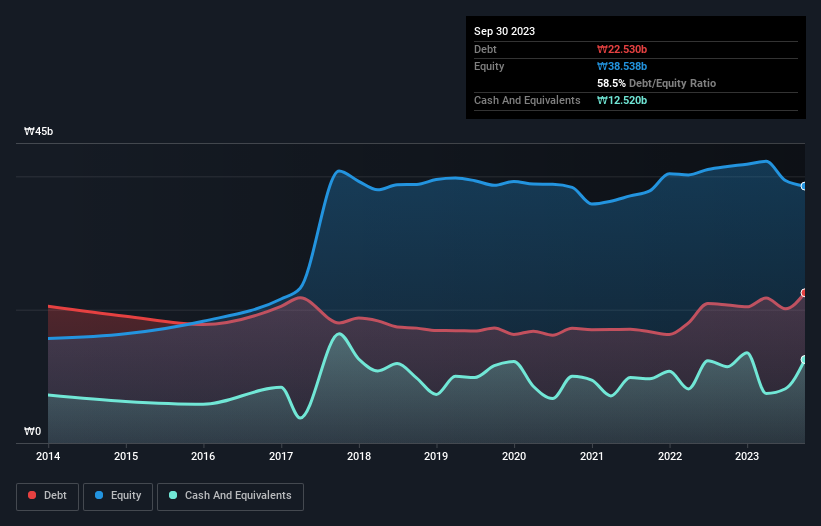- South Korea
- /
- Electrical
- /
- KOSDAQ:A140670
Here's Why RS AutomationLtd (KOSDAQ:140670) Can Afford Some Debt
Legendary fund manager Li Lu (who Charlie Munger backed) once said, 'The biggest investment risk is not the volatility of prices, but whether you will suffer a permanent loss of capital.' When we think about how risky a company is, we always like to look at its use of debt, since debt overload can lead to ruin. As with many other companies RS Automation Co.,Ltd. (KOSDAQ:140670) makes use of debt. But the real question is whether this debt is making the company risky.
What Risk Does Debt Bring?
Debt and other liabilities become risky for a business when it cannot easily fulfill those obligations, either with free cash flow or by raising capital at an attractive price. In the worst case scenario, a company can go bankrupt if it cannot pay its creditors. However, a more usual (but still expensive) situation is where a company must dilute shareholders at a cheap share price simply to get debt under control. Of course, the upside of debt is that it often represents cheap capital, especially when it replaces dilution in a company with the ability to reinvest at high rates of return. When we think about a company's use of debt, we first look at cash and debt together.
Check out our latest analysis for RS AutomationLtd
What Is RS AutomationLtd's Debt?
You can click the graphic below for the historical numbers, but it shows that as of September 2023 RS AutomationLtd had ₩22.5b of debt, an increase on ₩20.7b, over one year. However, because it has a cash reserve of ₩12.5b, its net debt is less, at about ₩10.0b.

How Healthy Is RS AutomationLtd's Balance Sheet?
We can see from the most recent balance sheet that RS AutomationLtd had liabilities of ₩33.6b falling due within a year, and liabilities of ₩4.04b due beyond that. Offsetting this, it had ₩12.5b in cash and ₩14.5b in receivables that were due within 12 months. So it has liabilities totalling ₩10.6b more than its cash and near-term receivables, combined.
Since publicly traded RS AutomationLtd shares are worth a total of ₩178.5b, it seems unlikely that this level of liabilities would be a major threat. However, we do think it is worth keeping an eye on its balance sheet strength, as it may change over time. When analysing debt levels, the balance sheet is the obvious place to start. But you can't view debt in total isolation; since RS AutomationLtd will need earnings to service that debt. So if you're keen to discover more about its earnings, it might be worth checking out this graph of its long term earnings trend.
Over 12 months, RS AutomationLtd made a loss at the EBIT level, and saw its revenue drop to ₩91b, which is a fall of 7.9%. That's not what we would hope to see.
Caveat Emptor
Importantly, RS AutomationLtd had an earnings before interest and tax (EBIT) loss over the last year. Indeed, it lost ₩1.1b at the EBIT level. When we look at that and recall the liabilities on its balance sheet, relative to cash, it seems unwise to us for the company to have any debt. So we think its balance sheet is a little strained, though not beyond repair. Another cause for caution is that is bled ₩468m in negative free cash flow over the last twelve months. So to be blunt we think it is risky. There's no doubt that we learn most about debt from the balance sheet. But ultimately, every company can contain risks that exist outside of the balance sheet. For instance, we've identified 2 warning signs for RS AutomationLtd (1 doesn't sit too well with us) you should be aware of.
Of course, if you're the type of investor who prefers buying stocks without the burden of debt, then don't hesitate to discover our exclusive list of net cash growth stocks, today.
New: AI Stock Screener & Alerts
Our new AI Stock Screener scans the market every day to uncover opportunities.
• Dividend Powerhouses (3%+ Yield)
• Undervalued Small Caps with Insider Buying
• High growth Tech and AI Companies
Or build your own from over 50 metrics.
Have feedback on this article? Concerned about the content? Get in touch with us directly. Alternatively, email editorial-team (at) simplywallst.com.
This article by Simply Wall St is general in nature. We provide commentary based on historical data and analyst forecasts only using an unbiased methodology and our articles are not intended to be financial advice. It does not constitute a recommendation to buy or sell any stock, and does not take account of your objectives, or your financial situation. We aim to bring you long-term focused analysis driven by fundamental data. Note that our analysis may not factor in the latest price-sensitive company announcements or qualitative material. Simply Wall St has no position in any stocks mentioned.
About KOSDAQ:A140670
RS AutomationLtd
Designs, develops, manufactures, sells, and services automation equipment and systems in South Korea and internationally.
Adequate balance sheet with low risk.
Market Insights
Community Narratives


Recently Updated Narratives

Astor Enerji will surge with a fair value of $140.43 in the next 3 years

Proximus: The State-Backed Backup Plan with 7% Gross Yield and 15% Currency Upside.


A case for for IMPACT Silver Corp (TSXV:IPT) to reach USD $4.52 (CAD $6.16) in 2026 (23 bagger in 1 year) and USD $5.76 (CAD $7.89) by 2030
Popular Narratives


MicroVision will explode future revenue by 380.37% with a vision towards success


The company that turned a verb into a global necessity and basically runs the modern internet, digital ads, smartphones, maps, and AI.



